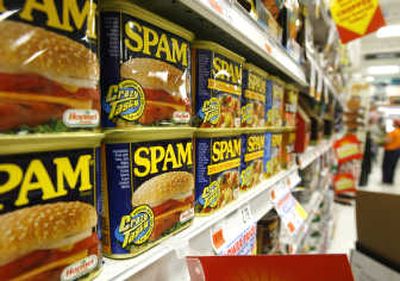In leaner times, a Spam revival

MILWAUKEE – Love it, hate it or laugh at it – at least it’s inexpensive.
Sales of Spam, that maligned meat, are rising as consumers turn more to lunch meats and other lower-cost foods to extend their food budgets.
What was once cheeky, silly and the subject of a musical (Monty Python mocked the meat in a can), is back on the table as costs rise, analysts say.
Food prices are increasing faster than they’ve risen since 1990, at 4 percent in the U.S. last year, according to the Agriculture Department. Many staples are rising even faster, with white bread up 13 percent last year, bacon up 7 percent and peanut butter up 9 percent.
There’s no sign of a slowdown. Food inflation is running at an annualized rate of 6.1 percent as of April, according to the Bureau of Labor Statistics.
The price of Spam is up, too, with the average 12-ounce can costing about $2.62. That’s an increase of 17 cents, or nearly 7 percent, from the same time last year. But it’s not stopping sales.
Kimberly Quan, a stay-at-home mother of three who lives just outside San Francisco, has been feeding her family more Spam in the past six months as she tries to stretch her food budget.
She cooks meals like Spam fried rice and Spam sandwiches two or three times a month, up from once a month previously.
Pulling Spam from the shelf prevents last-minute grocery store trips and overspending, said Quan, 38, of Pleasanton, Calif.
“It’s canned meat, and it’s in the cupboard, and if everything else is gone from the fridge, it’s there,” she said.
Spam’s maker, Hormel Foods Corp., reported last week that it saw strong sales of Spam in the second quarter, helping push up its profits 14 percent. According to sales information coming from Hormel, provided by the Nielsen Co., Spam sales were up 10.6 percent in the 12-week period ending May 3, compared to last year. In the last 24 weeks, sales were up nearly 9 percent.
The Austin, Minn.-based company, also known for the Jennie-O Turkey Store, has embarked on its first national advertising campaign for the 71-year-old brand in several years. They’ve credited the sales increase to that, along with new products such as individually packaged “Spam Singles” slices. Also helping sales, executives said in an earnings conference call, was the fact that people looking to save money are skipping restaurant meals and eating more at home.
Spam sales are reaching across all spectrums, young and old and rich and poor, said Swen Neufeldt, Hormel’s group product manager for the area that includes Spam. Many of the eaters are new to Spam, which was created in 1937 and gained fame as the meat that fed Allied troops during World War II.
Hormel began its national advertising campaign, including print and television, for Spam in January. Neufeldt said such campaigns are planned in advance and it wasn’t tied to perceived weakness in the economy.
Consumers are quick to realize that meats like Spam and other processed foods can be substituted for costlier cuts as a way of controlling costs, said Marcia Mogelonsky, senior research analyst with Mintel International in Chicago.
“They might not have Spam at every single meal, but they might supplement a couple of meals,” she said.